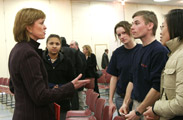Town Hall goes west

Principal Heather Munroe-Blum talks to students after the March 15 Town Hall Meeting
Owen Egan
The third town hall this year was held at Macdonald Campus on March 15. Principal Heather Munroe-Blum began her opening remarks by thanking departing dean, Deborah Buszard, for nine years of leadership and accomplishment. She also reminded the audience that the Task Force on Student Life and Student Learning will be officially launched in a short while. The Principal announced that professor David Lewis, from the Department of Natural Resource Sciences, has agreed to be a member of the Task Force and she encouraged students to provide input and suggestions on how best to advance the quality of life and learning at McGill.
The intertwined themes of constraints and priorities were recurrent in the discussions.
In response to concerns raised by Terry Spithill, director of the Institute of Parasitology, about lack of sufficient teaching and lab space for the graduate biotechnology programs, Munroe-Blum stated that the current university planning exercise is looking at priorities, including allocation of existing space and development of new space. She affirmed that funding for graduate students and research facilities is a major preoccupation for the senior administration.
A student recounted how his experience trying to get around with a broken ankle this winter taught him that handicapped people were poorly served on the western campus. An enterprising spirit, he decided to study the problem and work with the Office for Students with Disabilities to try to improve facilities, only to run into financial and administrative impediments. Munroe-Blum commended the initiative and assured the student that progress is being made. She suggested he reduce the proposals to those most likely to be implemented, and then to work with as many interested parties as possible to push for them. "This issue is very active on the agenda," she assured him.
We are receiving mixed messages from the administration, said Gaetan Faubert, of the Institute of Parasitology. On the one hand we are pushed to seek ever more research funding and students but we are not being given adequate space, personnel and other infrastructure support when we are successful in doing so. For example, significant CFI grants have given some professors the means to install very high-tech equipment for their projects, but the university is unwilling to pay for the technicians required to maintain them. This example and others lead some people to believe that the Macdonald Campus is not receiving its fair share of attention. There has been dramatic new investment at Macdonald, the principal replied, but underfunding is a factor that affects the entire university and so we are constantly forced to make priorities. She pointed out that the student-faculty ratio on the Macdonald Campus is the lowest one at McGill.
A large contingent of students and staff from the Department of Agricultural Economics attended the meeting. They voiced their fear that social science is being devalued within the university and their dissatisfaction with the treatment of their program within the Faculty. "We are a comprehensive university and that means the social sciences and the humanities are deeply important intellectual and academic programs at McGill," the principal said. Despite the disproportionate government funding for other areas in recent years, McGill is committed to maintaining our character and our quality as a comprehensive university, she affirmed.
Plant Science professor Danielle Donnelly and several students criticized the university for not showing solidarity with the students who are striking for more government student aid. While supporting the right of Donnelly and others to take that position, Munroe-Blum disagreed with the strike tactic. "Government bursaries are only one dimension of a very complex issue," she said. "We are doing all we can to improve financing for universities, including much better financial support for the students." Because students were raising several other concerns at the same time - such as on-campus medical services, daycare facilities and shuttle bus scheduling - she reiterated the necessity for setting priorities in one's wish list.
The principal thanked a student who wanted to see more attention paid to environmental issues on campus. McGill has recently introduced important improvements in recycling and paper use, but the administration is always trying hard to keep up with the students, who "are the absolute drivers in the process," she said.
A novel suggestion from a student caught the principal's imagination. He asked for a class-free lunch hour policy, as a way to improve morale by allowing more student activities during the day. Without committing to the proposal, the principal did say that she thought it a very interesting idea.
Although many of the speakers had expressed frustration or disagreement with specific university policies or actions, it was evident by the applause at the end of the meeting that the assembly had appreciated the opportunity to interact directly with the principal and would welcome her back to the Mac campus to continue the dialogue.
